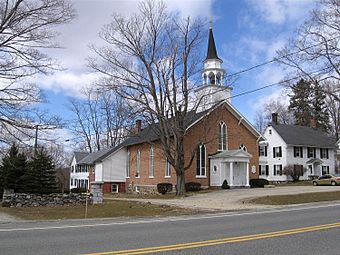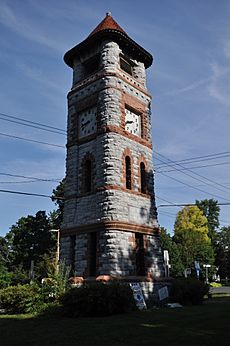Sharon Historic District (Sharon, Connecticut) facts for kids
Quick facts for kids |
|
|
Sharon Historic District
|
|

Episcopal Church in Sharon
|
|
| Lua error in Module:Location_map at line 420: attempt to index field 'wikibase' (a nil value). | |
| Location | Roughly, Main St. from Low Rd. to jct. with Mitchelltown, Amenia Union and W. Woods Rds., Sharon, Connecticut |
|---|---|
| Area | 360 acres (150 ha) |
| Architect | Price, Bruce; Rich, Charles A. |
| Architectural style | Colonial Revival, Greek Revival, Federal |
| NRHP reference No. | 93000257 |
| Added to NRHP | April 15, 1993 |
The Sharon Historic District is a special area in Sharon, Connecticut. It's like a time capsule showing how the town grew! At its heart is a long, green park, about a mile long. Around this green, you'll find many old public buildings, churches, and homes built from the 1700s to the 1900s. The southern part of the district has many beautiful country houses, especially those in the Colonial Revival style. This whole area was added to the National Register of Historic Places in 1993 because of its important history and architecture.
Contents
Discovering Sharon's Past
Sharon was started way back in 1739. It grew into an important crossroads town. This means many roads met there, helping trade and travel. The town was most successful in the early 1800s. Because of this, many buildings from that time, in the Federal style, line the long town green.
How Sharon Grew Over Time
The town green originally stretched north and south. It met at the main intersection of Main Street with Cornwall Bridge and Amenia Roads. Even though railroads didn't come through Sharon, the town still did well. This was thanks to nearby iron mines and furnaces.
By the 1880s, the iron industries started to slow down. But something new began to grow: tourism! People started visiting Sharon for its beauty. This led to big changes, especially in the southern part of the green. Large country estates were built there. Many of these were new homes in the Colonial Revival style. Others were older buildings that got a big makeover.
Meanwhile, the northern part of the green also changed. More Victorian-style houses were built. New public buildings also appeared, adding to the town's look.
Exploring the District's Layout
The historic district is long and narrow, stretching for several miles. It centers around the spot where Cornwall Bridge and Amenia Roads meet Main Street. The district goes south to where South Main Street meets Mitchelltown and Amenia-Union Roads. It extends north to Low Street. Most of the important buildings are on Main Street. However, some are on the streets nearby.
What Buildings Can You See?
You can see many interesting buildings in the district. There are four different church buildings. There's also a library built in 1893 in the Romanesque style. Don't miss the memorial clock tower, which stands southeast of the main intersection.
Some buildings in the district are so important they are listed separately on the National Register of Historic Places. These include:
- The brick Ebenezer Gay House, which is now a museum for the historical society.
- The George King House.
- The James Pardee House.
These buildings help tell the story of Sharon's rich history and its beautiful architecture.
 | Selma Burke |
 | Pauline Powell Burns |
 | Frederick J. Brown |
 | Robert Blackburn |


